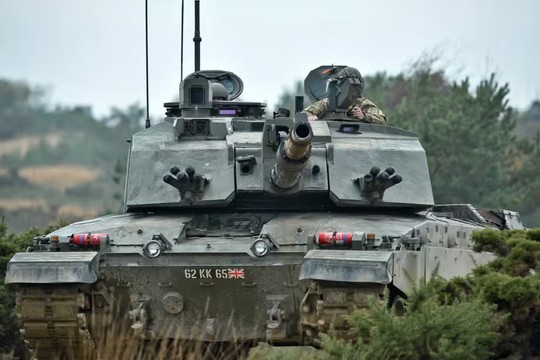British Challenger 2 tanks ‘used in Ukraine’s Russian incursion’.
It comes after the UK Government confirmed Kyiv was free to use UK weapons in its offensive in Kursk oblast.
Photo: PA
‘Responsible Statecraft’, a publication of analysis, opinion, and news that seeks to promote a positive vision of U.S. foreign policy based on humility, diplomatic engagement, and military restraint, asked some experts to gauge the short and long term effects of Kyiv’s bold invasion on the war.
Beginning Aug. 6, the Ukrainian military launched a surprise, cross-border offensive against Russia in the eastern Kursk region. So many questions remain about the Ukrainian strategy, the Russian response and what long term impact this may have — or not — on the overall war, including the potential for future negotiations, the effect on morale on both sides, and whether this emboldens Ukraine’s supporters, including the U.S., to help re-energize what was looking like a foundering war effort on the Ukrainian side.
So we put the following question to a well-rounded group of foreign policy experts: "What is the likely impact of current Ukrainian military incursions into the Russian Kursk region on the broader Ukraine War?"
Jasen J. Castillo, Co-Director, Albritton Center for Grand Strategy, George H.W. Bush School of Government, Texas A&M University
My worry is that in the longer term, Ukraine, which is facing dangerous shortfalls in manpower and equipment, will deplete elite units that would have been needed elsewhere. In a war of attrition, manpower and equipment are essential. Ukraine's attack reminds me of Germany's audacious Western offensive in 1944 that surprised the Allies, made gains, and ended with a defeat at the Battle of the Bulge, which then wasted manpower and equipment it needed months later on the Eastern Front.
Ivan Eland, Director of the Independent Institute’s Center on Peace & Liberty.
Conducting offensive operations is usually much more costly in personnel and equipment than being on defense, so is it worth it for Ukraine to divert forces from already thin defense lines to go on a risky offensive with only nebulous benefits? Russia’s offensive is already making headway, and because Russia outnumbers and outguns Ukraine, it may not need to denude its attack forces in Ukraine to defend Russian territory.
Mark Episkopos, Eurasia Research Fellow at the Quincy Institute for Responsible Statecraft and Adjunct Professor of History at Marymount University
The Kursk incursion seems to have been premised on the assumption that Ukraine can exploit Russia’s thinly manned border defenses to seize large swathes of land — including the Kursk nuclear power plant — in the first 48-72 hours, presenting Moscow with a fait accompli that can be used as a bargaining chip to quickly force a ceasefire and potentially even set the stage for peace talks on Ukraine’s terms. But Russia appears to have thwarted the AFU’s attempts to significantly expand its initial beachhead, and Ukraine lacks the long-term capacity to hold even the modest territory that it is currently contesting.
John Mearsheimer, R. Wendell Harrison Distinguished Service Professor at the University of Chicago, and non-resident fellow at the Quincy Institute
Ukraine’s invasion (of Kursk) was a major strategic blunder, which will accelerate its defeat. The key determinant of success in a war of attrition is the casualty-exchange ratio, not capturing territory, which Western commentators obsess over. The casualty-exchange ratio in the Kursk offensive decisively favors Russia for two reasons. First, it has caused relatively few Russian casualties because Ukraine’s army effectively overran undefended territory. Second, once alerted to the attack, Moscow quickly brought massive airpower to bear against the advancing Ukrainian troops, who were in the open and easy to strike. Unsurprisingly, the attacking forces lost many soldiers and a huge proportion of their equipment.
Sumantra Maitra, Director of research and outreach, the American Ideas Institute, author of “Sources of Russian Aggression”
If Ukraine taking the war to Russia was to bring Russia to negotiate from a position of weakness, it will fail, simply because Ukrainians don't have the manpower to sustain this push and subsequent occupation. It is a good PR victory for Ukrainian backers in the West. What it also might do is harden the Russian position, embolden the hardliners in the Russian government, and dissuade Putin from pushing for any negotiations for peace, especially after a new administration is elected in the U.S. Which, maybe, was the actual aim of the Ukrainian government, or whoever is advising them.
Stephen Walt, Robert and Renee Belfer Professor of International Affairs, Yale University
The Ukrainian incursion into Russia is a sideshow intended to bolster Ukrainian morale and give the West confidence to keep backing Kyiv, but it will not affect the outcome of the war. Ukrainian forces have reportedly seized about 1000 square kilometers of poorly defended Russian territory. Russia’s total land mass is more than 17 million square kilometers, which means that Ukraine now “controls” 0.00588% of Russia.
By comparison, Russian forces currently occupy roughly 20 percent of Ukraine and the failed Ukrainian offensive last summer shows how difficult it will be for Ukraine to retake these areas.
Ukraine’s fate will be determined by what happens in Ukraine, and not by this operation.
read more in our Telegram-channel https://t.me/The_International_Affairs

 9:18 17.08.2024 •
9:18 17.08.2024 •























